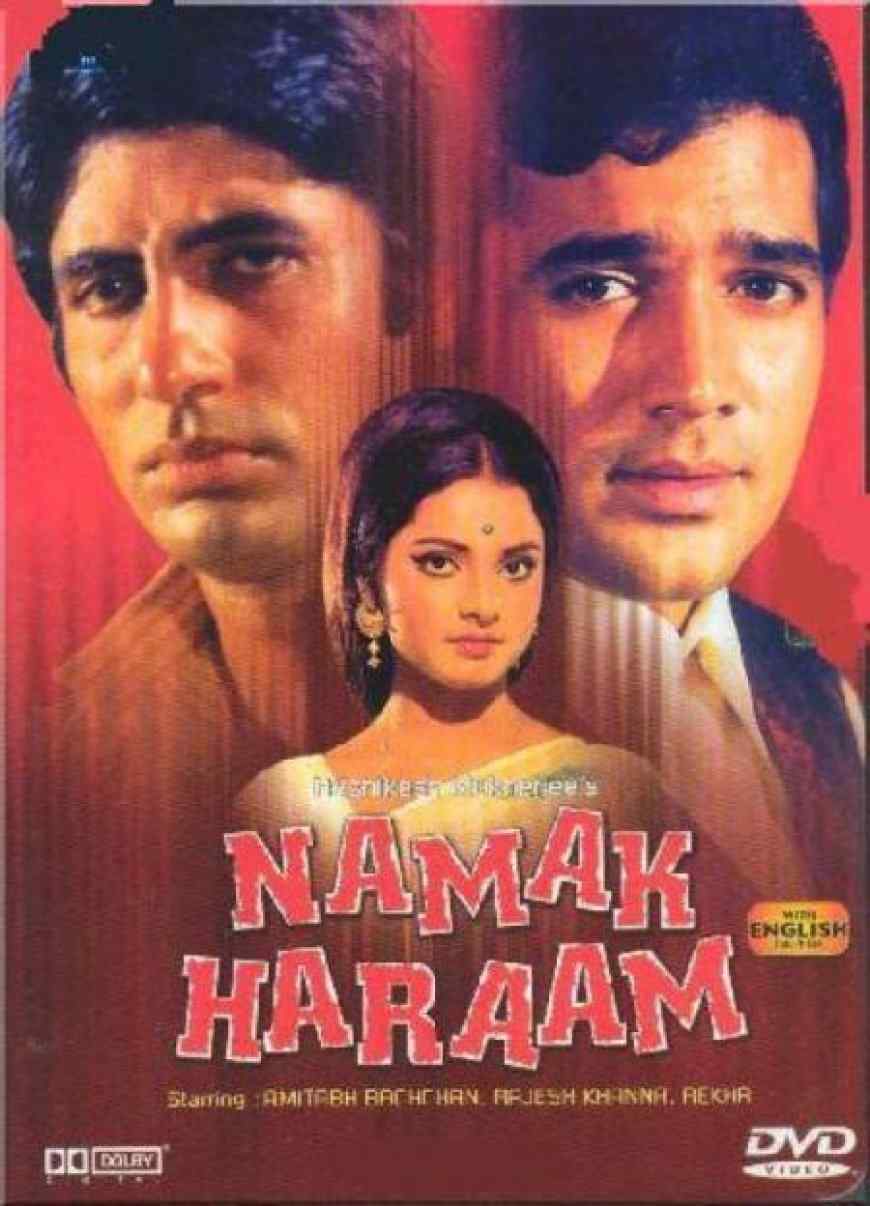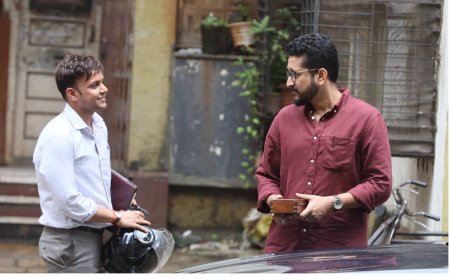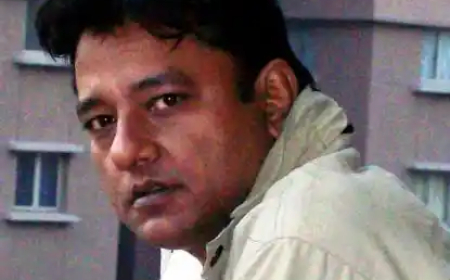50 YEARS OF NAMAK HARAM
Dr. Shoma A. Chatterji has written a captivating piece commemorating the 50th anniversary of the film Namak Haram.

Namak Haram is said to be a simplified, mainstream, Indianised and contemporary version of the English film, Peter Glenville’s “Becket” produced by Paramount featuring two screen giants Richard Burton and Peter O’Toole In 1964. It narrated the story of two very close friends not in the same hierarchy which does not push a dent in their friendship, till…
Hrishikesh Mukherjee, who knew the pulse of his mainstream Indian audience, stripped the glamour, the chutzpah and the regal backdrop of the original Becket and turned it into a contemporary, Indian story of a close friendship between two social and financial unequals, Vicky (Amitabh Bachchan) and Somu (Rajesh Khanna) which fails to turn out the way planned by the two friends to end in tragedy. Using a close friendship into a diabolic manipulation to control the labour unrest in Vicky’s father’s factory destroys the friendship forever. Because along the way, Somu, the humble and ordinary friend, made to join the factory as a worker disguised as Chander, changes sides to side with the factory workers whose rights the employer – Vicky’s father, does not protect. Somu is very poor and lives with his mother and sister in a ramshackle home which the motherless Vicky finds solace in.
The meaning of the term “Namak Haram”
According to Middle-eastern history, salt in food was considered a sign of infinite loyalty by the one who consumes the salt towards the person who gives him the salt. “Namak” means salt. Salt has since then symbolized a person's loyalty and fidelity to that someone in return for the favor that person has gained from the benefactor at any point of time. This sense of fidelity is ordained for life. “Halal” an Urdu/Persian word means “righteousness” or “forever faithful”. “Haram” is diametrically opposite in meaning which means “moral traitor” to a benefactor. In other words, it is a substitute for “traitor”.
Thus, while namak haram refers to a cold blooded traitor who does not blink an eye before damaging/destroying/betraying a friend/supporter/sympathizer/helper, namak halaal refers to one who remains loyal to whomsoever has helped him in some way or other sometime, somewhere, along the journey of life.
In the film, an angry and furious Vicky, shocked at Somu’s changing over to the side of the workers, calls Somu a “namak haram” and Somu responds with a sarcastic smile and indicates that from Vicky’s perspective, he is a namak haram. It is used as a term of insult and abuse and this is precisely how Vicky describes his closest friend who, he shockingly discovers, is no longer the close friend he thought he was.
Namak Haram explores the metamorphosis of personalities of two close friends who fall on opposite sides of each other when they start supporting two opposing ideologies. Vikram is a supporter of capitalism while Chander feels that the workers are underpaid and undervalued. This Marxist angle is just for the sake of the bonding between two friends and their subsequent break-up and does not have any political angle but a humane angle which Bachchan and Khanna may have found quite challenging.
Who is “Vicky”?
The story suggests that the rich are blind to the trials suffered by the poor. Once, after a long wait for his friend, an upset Vikram (Vicky) goes to the workers basti in disguise and spies on Somu who is now disguised under the fake name Chander so that the workers do not know that he is Vicky’s close friend and has come to control the unrest among the workers on his friend Vicky’s behalf. Vicky tries to see what he is up to. Chander is having a good time in his fellow worker’s house and is teasing his new love, Shama (Rekha). Vikram peeps through the window and walks away in anger. This marks Vicky out as “The Other” because he is a rebel within his own class refusing to cow down to his father’s immoral business strategies. Vicky blends himself completely into “The Other” because he not only begins to understand Somu’s changed point of view but as his realization comes quite late in the day, he consolidates his position as “The Other” by accepting the responsibility for Somu’s disastrous death for which he is not responsible at all. This too, marks him out boldly as “The Other.”
Mukherjee could have given a more creative and aesthetic closure to the film by basing it on a straightforward script without resorting to the flashback mode. It should have closed on the brief meeting between Vicky and his sick father when the old man comes to meet his son in prison. The old man has now aged and is stripped of his arrogance and his power. Having suffered his third attack the day Vicky was sentenced, he now walks haltingly with the help of a walking stick.
The two men stand on either side of the prison bars, the father on the freer side and the son on the captive side. Their positions about which of the two is standing on which side becomes open to question and debate. When we see the shadow of the prison bar on the older man’s face, it is clear that he is on the other side while the camera turns around to close in on Vicky’s sad, strong and proud face. But is he the one behind bars or is his father imprisoned within his own guilt?
The repentant father is very sad about his plan having misfired as his only son is taken from him forever. When the father asks him if Vicky confessed to Somu’s murder to save his old father from a prison sentence, Vicky, very forcefully, with anger simmering in his deep-set eyes, says, “No. I did it because I knew that with your power and your affluence, you would have easily saved yourself and I did not wish that. I wanted you to experience double the pain of what I have suffered. I lost my mother when I was three years old. I found my mother, brother, and sister in Somu’s mother, Somu, and his sister. Somu for me, was more than a friend. You have punished his mother and his sister along with me.” The father remains silent as tears flow down his cheeks. To appease him, Vicky adds, “Doesn’t a son have the right to pay for his father’s sins?” silencing his father for good who smiles a bit. When the older man turns his back, Vicky adds, “Take care of yourself, Dad” and the brief conversation ends there.
The older man walks away from the cell out into the world while the son keeps looking, his back to the camera, the soundtrack filled with the soft sounds of the father’s walking stick piercing the silence of the prison. …
But the film ends with Vicky, released after his long prison term, coming to meet Sonu’s mother and then, the camera tracks towards a large, garlanded portrait of Somu writing a very melodramatic end to a moving film. The other drawbacks of the film are – the very loud background score which undercuts the beautiful songs composed by R.D. Burman and disturbs the narrative, the introduction of the alcoholic poet (Raza Murad) who spouts some beautiful songs, a needless interruption, and of course, the terrible acting by Simi Garewal as Vicky’s girlfriend.
Namak Haram fetched for Rajesh Khanna the BFJA Award for Best Actor (Hindi) and Bachchan won his second Filmfare Award for Best Supporting Actor. Gulzar bagged The Best Dialogue Award and Asrani won the award for the Best Comedian from Filmfare. Namak Haram was a box office hit and was the 5th highest-grossing film of 1973. But Bachchan vowed never to work with Rajesh Khanna ever again and he kept his promise throughout his career.
***
What's Your Reaction?


































































